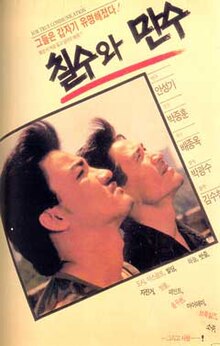Chilsu and Mansu
| Chilsu and Mansu | |
|---|---|

Poster for Chilsu and Mansu (1988)
|
|
| Hangul | |
| Revised Romanization | Chilsuwa mansu |
| McCune–Reischauer | Ch‘ilsuwa mansu |
| Directed by | Park Kwang-su |
| Produced by | Lee Woo-suk |
| Written by | Choe In-seok Chi Sang-hak Lee Sang-woo |
| Starring |
Ahn Sung-ki Park Joong-hoon |
| Music by | Kim Soo-chul |
| Cinematography | You Young-gil |
| Edited by | Kim Hyeon |
| Distributed by | Dong-a Exports Co. Ltd. |
|
Release date
|
|
|
Running time
|
108 minutes |
| Country | South Korea |
| Language | Korean |
Chilsu and Mansu (Hangul: 칠수와 만수; RR: Chilsuwa Mansu) is a 1988 South Korean film, and noted director Park Kwang-su's debut film. Though not a box-office hit (only attracting 73,751 people in theatres), the film is remembered as a major step towards freedom of expression in South Korean cinema.
Chilsu and Mansu marks the directorial debut of Park Kwang-su, who would go on to become not only an accomplished director in his own right, but an influential role model for a new generation of socially conscious filmmakers. The film also marks one of the most memorable performances of two famous veteran actors, Ahn Sung-ki and Park Joong-hoon. The easy and convincing onscreen camaraderie shown by the two men would foreshadow their being cast together again in hit comedy Two Cops (1993) and action/art film Nowhere to Hide (1999). Even Bae Jong-ok, who plays Chil-su's girlfriend, continues to make her mark on contemporary cinema, taking on an acclaimed role in the award-winning Jealousy Is My Middle Name (2003).
1988 was the year of the Seoul Olympics, and a time of great political and social change for South Korea. Massive street protests against the military government and on behalf of workers' rights had recently reached their peak. However the Korean society portrayed through cinema in those days little resembled the passions on display in the street. Government censors, wielding an iron grip over the film industry, ensured that the slightest hint of social criticism was clipped in the screenplay or in the editing room before reaching audiences.
Chilsu and Mansu seemingly depicts the hopes and aspiration of Korean youth in the late 1980s, when the country was gradually democratizing. However, as the film progresses, the film does not turn out to be what the audience intended and ends with a standoff between the protagonists and the establishment.
This movie was based on the short story "Liang Ge Youqijiang" written by Huang Chunming; it was uncredited because Huang's works were banned in South Korea at the time.
...
Wikipedia
